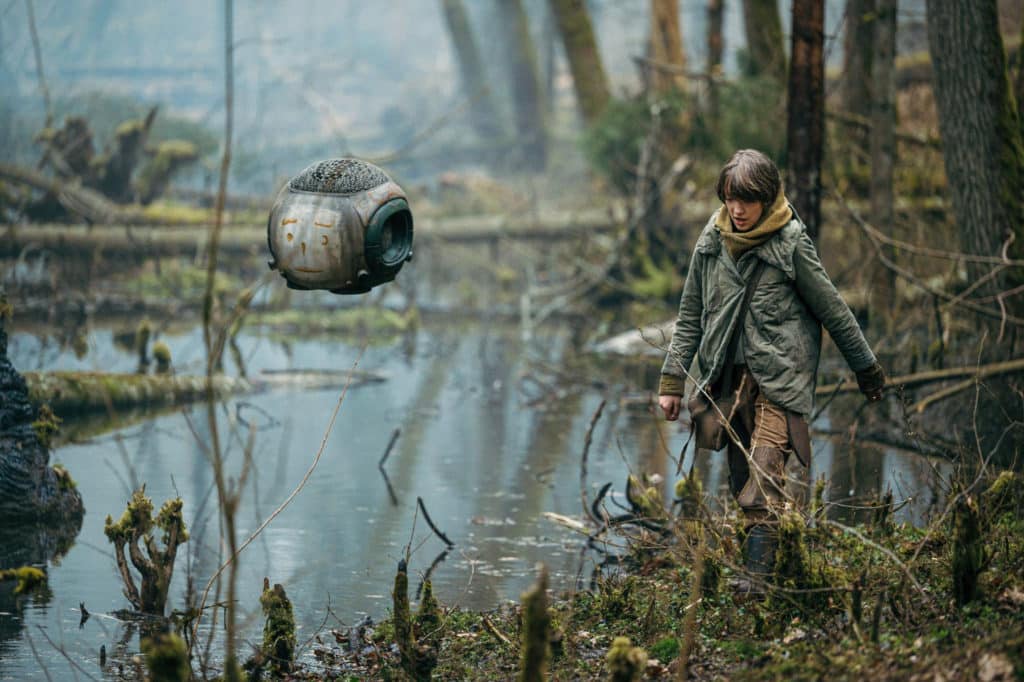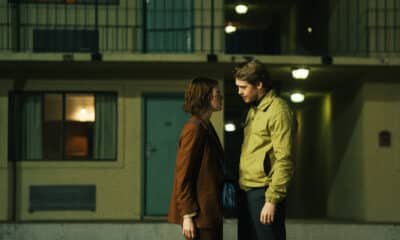In an attempt to prevent an impending ecological crisis, mankind turned to genetic technology. Their engineered viruses and organisms later escaped and ravished the planet. They wiped out plants, animals, and large chunks of the population, leaving few behind. Those that remain exist in a pseudo new Dark Age. Society is now run by an oligarchy, a safe few living in luxurious Citadels whilst the rest exist outside, having to trade and barter to live. It is here, in this wasteland of humanity, that the new sci-fi movie Vesper unfolds.

Directed by the pairing of Kristina Buozyte and Bruno Samper, Vesper joins one young woman, Vesper (Raffiella Chapman), as she struggles to look after herself and her disabled father (Richard Brake). Vesper spends her days scouring the land in search of things that she can trade. She is also continuing in her father’s footsteps by trying to engineer their own food. The problem is that although seeds still exist in this new world, the Oligarch have total control over them. This control isn’t just focussed on who can have access to them, each seed has been coded and constructed to yield only one crop. It’s a desperate life and one that Vesper is keen to shed. After taking in an injured Citadel citizen, Camellia (Rosy McEwen), Vesper seeks an opportunity for betterment.
Vesper’s new task is riddled with its own pitfalls, primarily linked to her Uncle Jonas (Eddie Marsan). Jonas is the leader of the community outside the Citadel. He rules the wasteland with an iron fist, mandating everyone to provide for him. Those that he deems no longer helpful or able to work, are disposed of. It’s a bleak and uncaring outlook and one that clashes with Vesper’s own idealistic views on what life could be. The whole film becomes one big game of chess as Uncle and Niece try to outwit one another.
With so much of Vesper revolving around the thoughts and intentions of its characters, this is a film that requires a willing cast. The actors here are all on top form. Eddie Marsan has always played villains well, and in Vesper he is chilling. Though devoid of emotion to the masses, Jonas has an uncomfortable obsession with his niece and her capability to breed. Jonas supplies the Citadel with the blood of the young to keep them healthy and he needs Vesper to further his line of stock. It is a murky plotline and motivation for a character, one that could veer into Alan Rickman’s Sheriff of Nottingham territory. Marsan keeps Jonas restrained, a move that allows his full malice to seep outward into all areas of the film.
It is upon the young shoulders of Raffiella Chapman that Vesper rests. Her performance is the perfect blend of vulnerability, innocence, resilience, and intelligence. Vesper is a lonely young teenager. Abandoned by her mother the year before, Vesper bears far more responsibility than anyone her age should. Being the sole provider and carer to her father is a weighty burden and the fact that she still retains hope is a testament to her character. Chapman plays the hope with a quiet optimism which suits the setting. She’s the perfect lead for the film and presents the kind of strong child character that will capture the hearts and imaginations of the audience. Whether they are old enough to be her parents, or themselves a peer, Vesper is a protagonist to whom all can connect with on some level.

The performances of both Richard Brake and Rosy McEwen also need praise. McEwen does great work as the outsider crashing into Vesper’s life. Her arrival causes a shockwave and the ripples echo throughout the narrative, opening up new avenues of exploration both emotionally and physically. Brake’s performance is two-fold. One requires him to be comatose and bed-ridden, and only able to communicate his emotions via his eyes. The other is vocal, delivered through a strange robotic contraption that resembles the head of a decapitated robot. This head floats alongside Vesper on her journeys outside, linked somehow to her father’s consciousness, keeping him present in her life. Both sides of Brake’s performance push the emotional heart of the film. His eyes are so expressive that with just one pained look he can reduce the audience to tears. It’s Brake at the top of his craft and yet he’s careful to not overshadow the compelling central turn of Chapman.
An important aspect of any science-fiction is the look and feel of the world. Buozyte and Samper have crafted a stunning environment of the backdrop of their story. The visuals land somewhere between Mediaeval and nuclear wasteland. There’s a grey coating to everything, the world covered in a dull cloak. It’s devoid of bright colours and with little stimulus it lacks emotion. This emptiness facilitates an atmosphere of dread and ensures that the emotions of the characters are the primary focus. Whilst it may be dank and dreary, there is a wicked beauty to what populates the screen. Weird and dangerous creatures stalk Vesper through the mutated forests of death.
This is a toxic environment on every level, with threats hiding around every corner. It acts as the perfect metaphor for the trials and tribulations of growing-up. In fact, the entirety of Vesper works as a tale of young versus old. Those that are seeking change and innovation for the betterment of everyone, and those that are complacent with the status quo. The opening scrawl that details humankind’s decline could be viewed as an eerie foreshadowing for our Earth’s future. A film that uses its science-fiction setting to explore real world ideas and anxieties, Vesper is a beautiful portrayal of timely issues. A wonder to look at, complemented by elegant performances, Vesper presents a haunting apocalyptic nightmare that is hard to pull away from.
Vesper
Kat Hughes
Summary
Vesper was reviewed at Grimmfest 2022. Vesper is in UK cinemas and on demand 21 October.
Kat Hughes is a UK born film critic and interviewer who has a passion for horror films. An editor for THN, Kat is also a Rotten Tomatoes Approved Critic. She has bylines with Ghouls Magazine, Arrow Video, Film Stories, Certified Forgotten and FILMHOUNDS and has had essays published in home entertainment releases by Vinegar Syndrome and Second Sight. When not writing about horror, Kat hosts micro podcast Movies with Mummy along with her five-year-old daughter.

Latest Posts
-


Film Trailers
/ 39 mins agoNew trailer for Shudder’s ‘Nightwatch: Demons Are Forever’
Coming to Shudder this May.
By Paul Heath -


Interviews
/ 3 hours agoInterview: Scoot McNairy talks new films ‘Blood For Dust’, ‘Speak No Evil’ & ‘Nightbitch’
In the film, McNairy plays Cliff, a former salesman with a chequered past.
By Kat Hughes -


Film Trailers
/ 15 hours agoAnother new trailer for upcoming horror movie ‘Longlegs’
Coming to cinemas this summer.
By Paul Heath -


Film News
/ 17 hours ago‘Speak No Evil’ star promises that the remake will be different
Last week the first trailer for the English language remake of Speak No Evil...
By Kat Hughes















